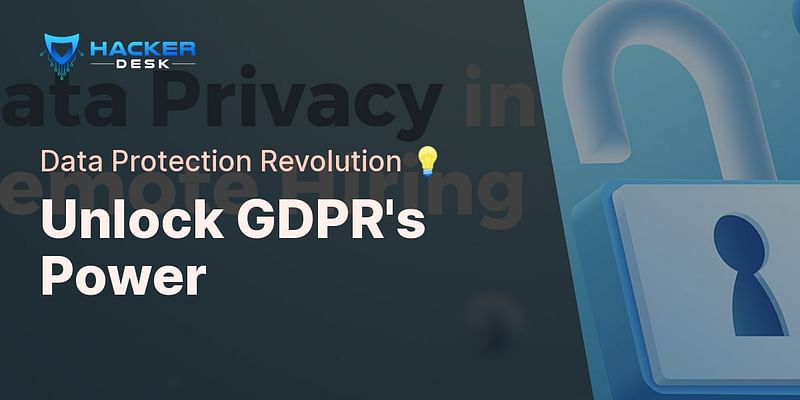Caleigh Gutkowski is a distinguished cybersecurity expert with over ten years of experience in the technology sector. Her expertise lies in detecting and preventing network intrusions. Caleigh is renowned for her talent in demystifying intricate security notions for the ordinary user.
GDPR, or General Data Protection Regulation, is a comprehensive data protection law that was implemented by the European Union (EU) in May 2018. It is designed to protect the personal data of individuals within the EU and regulate how organizations handle and process this data. As a network security professional, I cannot stress enough the importance of understanding GDPR and its implications for cybersecurity in today's digital world.
The primary goal of GDPR is to give individuals greater control over their personal data and ensure that organizations handle it responsibly. It applies to any organization that processes the personal data of EU citizens, regardless of where the organization is located. This means that even if your organization is based outside the EU, if you handle the personal data of EU citizens, you must comply with GDPR.
So, why is GDPR important? Let me break it down for you:
1. Enhanced Data Protection: GDPR strengthens the protection of personal data by imposing strict rules on how organizations collect, store, and process it. This includes obtaining explicit consent from individuals, implementing appropriate security measures, and notifying authorities of data breaches.
Key Aspects of GDPR for Enhanced Data Protection
| GDPR Aspect | Description | Example | Importance 🔒 |
|---|---|---|---|
| Explicit Consent | GDPR requires organizations to obtain clear and explicit consent from individuals before collecting their data. | Before signing up for a newsletter, a user must tick a box agreeing to their data being stored and used for this purpose. | Ensures individuals have control over their personal data and understand how it will be used. |
| Security Measures | Organizations must implement appropriate security measures to protect personal data. | Use of encryption and pseudonymization to secure data. | Prevents unauthorized access, data breaches, and ensures data integrity and confidentiality. |
| Data Breach Notification | In case of a data breach, organizations are required to notify the authorities and affected individuals within 72 hours. | If a company's database is hacked, they must inform the relevant data protection authority and the individuals whose data was potentially accessed. | Increases transparency and allows for quicker response to potential data misuse. |
| Data Minimization | GDPR encourages organizations to only collect and process the data that is necessary for a specific purpose. | A shopping website only asking for necessary information like name, address, and payment details during checkout. | Reduces the risk of data breaches and misuse by limiting the amount of data collected and stored. |
2. Increased Transparency: GDPR promotes transparency by requiring organizations to provide individuals with clear and concise information about how their data is being used. This helps individuals make informed decisions about sharing their personal information and builds trust between organizations and their customers.
Transparency in Data Usage
3. Individual Rights: GDPR grants individuals several rights concerning their personal data, such as the right to access, rectify, and erase their data. Organizations must have processes in place to handle these requests promptly and efficiently.
4. Accountability and Compliance: GDPR introduces a principle of accountability, making organizations responsible for demonstrating compliance with the regulation. This includes conducting data protection impact assessments, appointing a Data Protection Officer (DPO), and maintaining detailed records of data processing activities.
5. Global Impact: Even if your organization is not based in the EU, GDPR has a global impact. Many countries have adopted similar data protection laws inspired by GDPR, and organizations worldwide are aligning their practices with its principles. Understanding GDPR is crucial for maintaining compliance and avoiding hefty fines and reputational damage.
6. Cybersecurity: GDPR and cybersecurity go hand in hand. The regulation emphasizes the importance of implementing robust security measures to protect personal data from unauthorized access, loss, or destruction. Compliance with GDPR can help organizations strengthen their cybersecurity posture and mitigate the risk of data breaches.
In conclusion, GDPR is a game-changer in the world of data protection and cybersecurity. It sets a high standard for organizations to handle personal data responsibly and gives individuals greater control over their information. Understanding GDPR and its implications is essential for organizations to stay compliant, build trust with their customers, and protect sensitive data in today's digital landscape.













